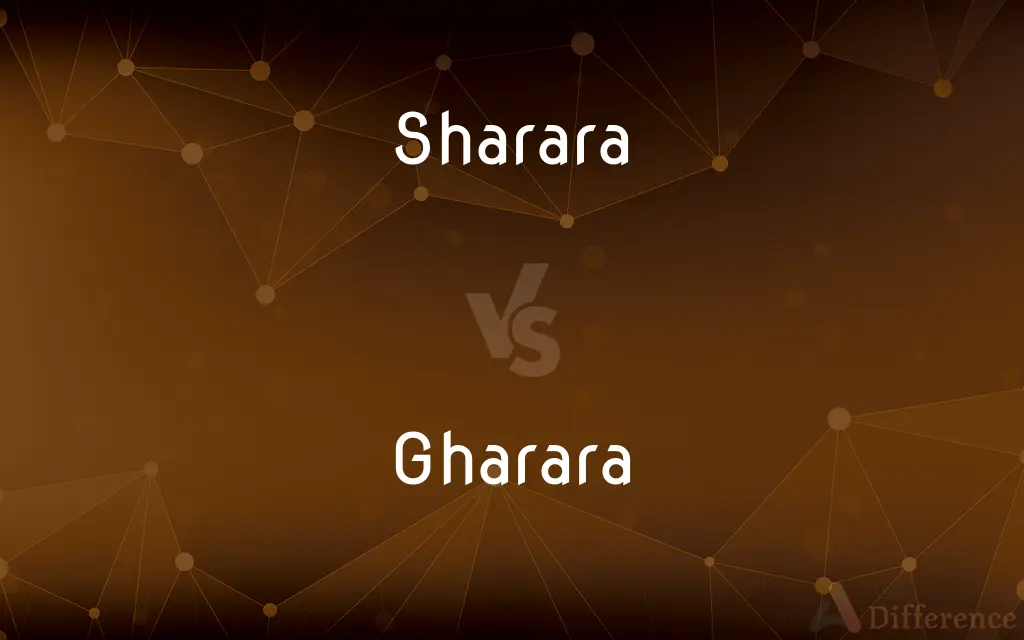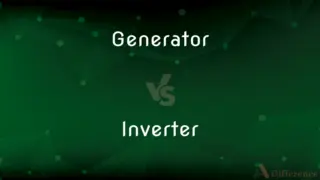Sharara vs. Gharara — What's the Difference?
Edited by Tayyaba Rehman — By Maham Liaqat — Published on April 4, 2024
Sharara is wide-legged pant, flaring from the waist, resembling a full skirt, often worn with a kurti. Gharara consists of a kurti and wide-legged pants that are ruched at the knee to flare out dramatically, offering a more traditional and elaborate look.

Difference Between Sharara and Gharara
Table of Contents
ADVERTISEMENT
Key Differences
Shararas are characterized by their wide-legged pants that are fitted at the waist and flare out dramatically, often giving the appearance of a full skirt. This outfit is typically paired with a long or short kurti and a dupatta, making it popular for its comfort and elegance. On the other hand, Ghararas consist of pants that are fitted from the waist to the knees and have a band at the knee (called "gota") where the fabric is gathered or pleated to create a dramatic flare from the knee to the hem, offering a more traditional and voluminous look.
The origin of shararas can be traced back to the Mughal era, where they were part of the royal attire, symbolizing elegance and grace. They have evolved over time to become a fashionable choice for weddings and festive occasions across South Asia. Ghararas also share a rich history from the same era, often worn by women of the royal families, particularly in Lucknow, India, which was known for its exquisite and intricate designs, making ghararas a symbol of traditional craftsmanship and cultural heritage.
In terms of styling and occasions, shararas are considered versatile and can be adapted for both formal and semi-formal events, depending on the fabric, embellishments, and design. They are favored for their ease of movement and modern appeal. Ghararas, with their elaborate designs and traditional look, are typically reserved for more formal occasions such as weddings and cultural ceremonies, often featuring intricate embroidery, beadwork, and luxurious fabrics.
The choice between sharara and gharara often depends on personal style, the occasion, and the desired level of formality. Shararas might be chosen for their modern appeal and comfort, suitable for a variety of events, whereas ghararas are preferred for their traditional elegance and are often chosen for grand celebrations and weddings.
Both sharara and gharara hold significant cultural value in South Asian fashion, embodying the richness of the region's textile heritage. While shararas offer a contemporary and fluid silhouette, ghararas celebrate the traditional and intricate craftsmanship of South Asian artisans, making each outfit unique in its own right.
ADVERTISEMENT
Comparison Chart
Design
Wide-legged pants, flaring from the waist, skirt-like appearance
Wide-legged pants, ruched at the knee to flare out dramatically
Origin
Mughal era, symbolizing elegance and grace
Mughal era, associated with royal families, especially in Lucknow
Occasions
Versatile for formal and semi-formal events
Reserved for more formal occasions like weddings
Styling
Paired with a long or short kurti and dupatta
Paired with a kurti and often features intricate embellishments
Appeal
Modern, comfortable, and adaptable
Traditional, elaborate, and culturally rich
Compare with Definitions
Sharara
A traditional outfit with wide-legged pants flaring from the waist, giving a skirt-like look.
She wore a vibrant sharara set to the festive gathering, its flowing silhouette catching everyone's eye.
Gharara
Often worn with a short kurti and features luxurious fabrics and elaborate embellishments.
The hand-embroidered kurti paired with her silk gharara was the highlight of her bridal ensemble.
Sharara
Suitable for a variety of occasions, from weddings to semi-formal events.
Her silk sharara set was adorned with delicate embroidery, ideal for the wedding reception.
Gharara
A symbol of cultural heritage, especially popular in Lucknow for its craftsmanship.
The Lucknowi gharara she chose for her wedding paid homage to her family's cultural roots.
Sharara
Known for its elegance and comfort, often worn with a kurti and dupatta.
The comfort and style of her sharara made it the perfect choice for the long day of celebrations.
Gharara
A traditional outfit with pants that are fitted from the waist to the knees and flare out from the knee, enhanced with a gota.
Her gharara, with its intricate gota work at the knees, exuded traditional elegance at the wedding.
Sharara
Modern interpretations include various fabrics and contemporary designs.
The designer's latest collection featured shararas in pastel hues with minimalist embellishments, appealing to modern tastes.
Gharara
Reflects the richness of South Asian artisanal traditions in its designs and details.
The detailed zari and zardozi work on her gharara showcased the exquisite craftsmanship of South Asian artisans.
Sharara
Embraced for its versatility and ease of movement.
Dancing at the event was a delight in the lightweight and graceful sharara.
Gharara
Favored for formal occasions and traditional ceremonies for its regal appearance.
The grandeur of her velvet gharara made it the perfect attire for the traditional ceremony.
Sharara
A pair of loose trousers worn, with a kameez and dupatta, by women in Pakistan.
Gharara
A traditional garment of Lucknow in India, consisting of kurti, dupatta, and wide-legged flaring trousers which are often elaborately embroidered.
Common Curiosities
Can men wear shararas or ghararas?
Traditionally, these outfits are designed for women, but fashion has no boundaries, and anyone can adapt these styles to their preference.
Can shararas be worn for casual occasions?
Yes, lighter fabrics and simpler designs can make shararas suitable for casual events.
Are there modern versions of ghararas?
Yes, designers often reinterpret traditional ghararas with contemporary touches for a modern appeal.
What kind of jewelry complements a sharara or gharara?
Traditional jewelry like jhumkas (earrings) and bangles enhance the look of both shararas and ghararas.
Are there specific fabrics that are best for these outfits?
Luxurious fabrics like silk, georgette, and velvet are popular, but the choice depends on the occasion and weather.
Are ghararas comfortable to wear?
While ghararas are elegant, their elaborate design might not be as comfortable as the more fluid shararas.
Is it possible to rent a sharara or gharara for an event?
Yes, many boutiques and online platforms offer rental services for these traditional outfits.
How do I choose between a sharara and a gharara?
Consider the occasion, your personal style, and comfort preference. Shararas are more versatile, while ghararas are traditional and formal.
How do I care for my sharara or gharara?
Follow the care instructions, usually involving dry cleaning, especially for outfits with elaborate embellishments.
Can shararas and ghararas be found in plus sizes?
Many designers and stores offer these outfits in a range of sizes or provide custom tailoring to ensure a perfect fit.
Share Your Discovery

Previous Comparison
Generator vs. Inverter
Next Comparison
Blackheads vs. MolesAuthor Spotlight
Written by
Maham LiaqatEdited by
Tayyaba RehmanTayyaba Rehman is a distinguished writer, currently serving as a primary contributor to askdifference.com. As a researcher in semantics and etymology, Tayyaba's passion for the complexity of languages and their distinctions has found a perfect home on the platform. Tayyaba delves into the intricacies of language, distinguishing between commonly confused words and phrases, thereby providing clarity for readers worldwide.













































